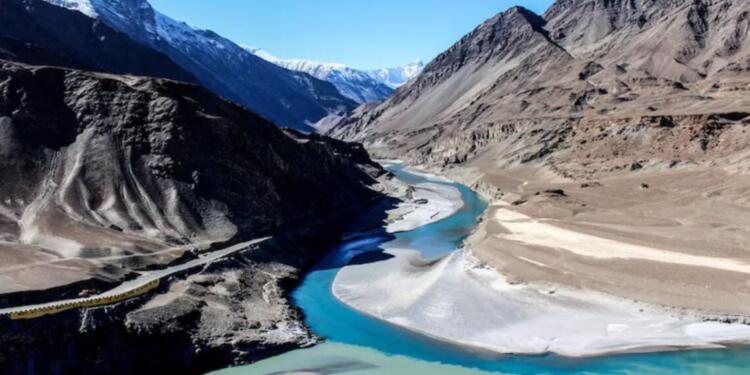India has strongly rejected a so-called “supplemental award” issued by the Court of Arbitration in relation to the Kishenganga and Ratle hydroelectric projects located in the Union Territory of Jammu and Kashmir. In a scathing statement, the Ministry of External Affairs (MEA) declared the court as “illegally constituted” and in violation of the 1960 Indus Waters Treaty (IWT), reaffirming that India does not recognise its jurisdiction or any decision emanating from it.
“This latest charade at Pakistan’s behest is yet another desperate attempt by it to escape accountability for its role as the global epicenter of terrorism,” the MEA said. India reiterated that any proceedings before this tribunal, and any subsequent rulings, are “illegal and per se void.”
The ruling comes at a time when India has already placed the Indus Waters Treaty in abeyance following the Pahalgam terrorist attack in April 2025, which left 26 civilians dead. In light of this, India has exercised its sovereign rights under international law to suspend treaty obligations until Pakistan “credibly and irreversibly” renounces cross-border terrorism.
What Was the Dispute About?
The dispute between India and Pakistan over the Kishenganga (330 MW) and Ratle (850 MW) hydroelectric projects has been brewing for years. These projects, located on the Jhelum and Chenab rivers respectively—part of the ‘western rivers’ under the IWT—have repeatedly drawn objections from Islamabad. Pakistan alleges that India’s construction could affect downstream water flow and is therefore a violation of the treaty.
India has consistently maintained that the projects are well within its rights under the treaty. According to Indian officials, these are “run-of-the-river” projects that adhere to all clauses of the IWT, including water flow regulations and engineering design requirements. India has also cited that multiple safeguards have been put in place to ensure treaty compliance and transparency.
Despite this, Pakistan continued to push for international arbitration, eventually supporting the formation of a Court of Arbitration. India, however, rejected the legitimacy of this tribunal, calling it a unilateral and unlawful exercise in breach of the treaty’s dispute resolution mechanisms.
Treaty in Abeyance: India’s Diplomatic Strike
Following the Pahalgam terror attack, India took the unprecedented step of putting the Indus Waters Treaty in abeyance—a major shift in regional diplomacy. “India is no longer bound to perform any of its obligations under the treaty,” the MEA stated. It cited international law principles, arguing that no country can be expected to maintain cooperative frameworks with a nation that sponsors terrorism.
New Delhi also sent a clear warning to Islamabad and the international community: any future terror attacks traced back to Pakistan would be considered acts of war. Prime Minister Narendra Modi’s doctrine—”blood and water cannot flow together”—has been repeatedly emphasized in India’s diplomatic messaging since the attack.
India further warned that it reserves the right to respond to any Pakistan-linked terror attack with military force anywhere in Pakistan, reiterating that “terror and talks cannot go hand in hand.”
Historical Background of the Indus Waters Treaty
Signed in 1960 and brokered by the World Bank, the Indus Waters Treaty has often been cited as a rare example of India-Pakistan cooperation. Under the terms of the agreement, India has control over the three eastern rivers Ravi, Beas, and Sutlej while Pakistan is entitled to the waters of the three western rivers Indus, Jhelum, and Chenab.
Despite frequent hostilities, both countries largely adhered to the treaty until recent years, when tensions spiked due to repeated terror attacks on Indian soil. India had always allowed Pakistani representatives to inspect its hydroelectric projects as a goodwill gesture, but growing frustrations over Pakistan’s use of international forums to stall Indian development led to a reevaluation of that approach.
The Kishenganga and Ratle projects became flashpoints not only for bilateral tensions but also for wider debates over sovereignty, water sharing, and national security.
Pakistan’s Tactical Diversion?
India has accused Pakistan of using fabricated legal channels to deflect attention from its own internal failures, especially in combating terrorism. “Pakistan’s resort to this fabricated arbitration mechanism is consistent with its decades-long pattern of deception and manipulation of international forums,” the MEA said.
Analysts view Pakistan’s actions as an attempt to draw international sympathy and scrutiny onto India’s development efforts in Jammu and Kashmir, diverting focus from Pakistan’s alleged support for terror networks operating across the Line of Control (LoC).
India has taken exception not only to the substance of Pakistan’s complaints but also to the platform it chose what New Delhi calls a “self-styled” and “non-existent in law” tribunal that undermines bilateral agreements.
India’s Water Diplomacy Turns Assertive
The rejection of the Court of Arbitration’s supplemental award marks a firm assertion of India’s evolving diplomatic and strategic posture. Once a patient signatory to the Indus Waters Treaty, India is now signalling that goodwill cannot be a one-sided affair especially when national security is at stake.
By placing the treaty in abeyance and unequivocally rejecting the authority of the so-called Court of Arbitration, India has not only drawn a diplomatic red line but also reaffirmed that future cooperation hinges on Pakistan dismantling its terror infrastructure. The message is unambiguous: until Pakistan ceases its policy of cross-border terrorism, agreements like the Indus Waters Treaty will not bind India in any form.
This episode underlines the transformation in India’s foreign policy marked by assertiveness, conditional engagement, and a zero-tolerance stance on terror. The global community, too, is being asked to take a closer look at Pakistan’s dual strategy of legal manipulation and covert aggression.





















